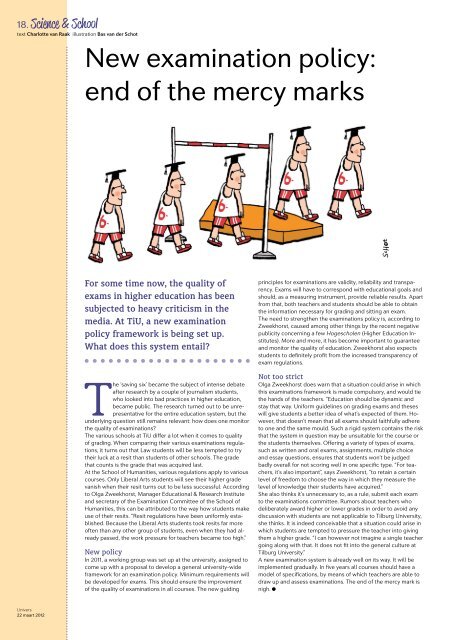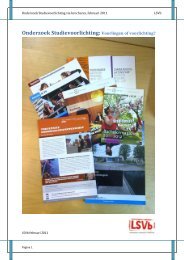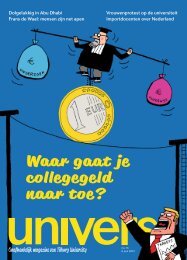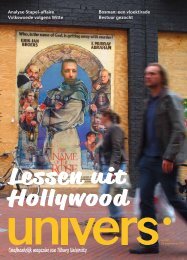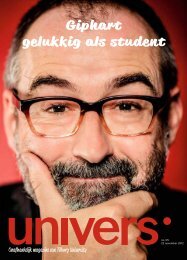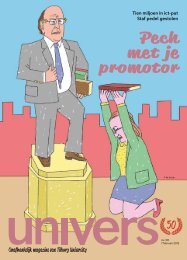Onafhankelijk magazine van Tilburg University
Onafhankelijk magazine van Tilburg University
Onafhankelijk magazine van Tilburg University
You also want an ePaper? Increase the reach of your titles
YUMPU automatically turns print PDFs into web optimized ePapers that Google loves.
18. Science & School<br />
text Charlotte <strong>van</strong> Raak illustration Bas <strong>van</strong> der Schot<br />
Univers<br />
22 maart 2012<br />
New examination policy:<br />
end of the mercy marks<br />
For some time now, the quality of<br />
exams in higher education has been<br />
subjected to heavy criticism in the<br />
media. At TiU, a new examination<br />
policy framework is being set up.<br />
What does this system entail?<br />
The ‘saving six’ became the subject of intense debate<br />
after research by a couple of journalism students,<br />
who looked into bad practices in higher education,<br />
became public. The research turned out to be unrepresentative<br />
for the entire education system, but the<br />
underlying question still remains rele<strong>van</strong>t: how does one monitor<br />
the quality of examinations?<br />
The various schools at TiU differ a lot when it comes to quality<br />
of grading. When comparing their various examinations regulations,<br />
it turns out that Law students will be less tempted to try<br />
their luck at a resit than students of other schools. The grade<br />
that counts is the grade that was acquired last.<br />
At the School of Humanities, various regulations apply to various<br />
courses. Only Liberal Arts students will see their higher grade<br />
<strong>van</strong>ish when their resit turns out to be less successful. According<br />
to Olga Zweekhorst, Manager Educational & Research Institute<br />
and secretary of the Examination Committee of the School of<br />
Humanities, this can be attributed to the way how students make<br />
use of their resits. “Resit regulations have been uniformly established.<br />
Because the Liberal Arts students took resits far more<br />
often than any other group of students, even when they had already<br />
passed, the work pressure for teachers became too high.”<br />
New policy<br />
In 2011, a working group was set up at the university, assigned to<br />
come up with a proposal to develop a general university-wide<br />
framework for an examination policy. Minimum requirements will<br />
be developed for exams. This should ensure the improvement<br />
of the quality of examinations in all courses. The new guiding<br />
principles for examinations are validity, reliability and transparency.<br />
Exams will have to correspond with educational goals and<br />
should, as a measuring instrument, provide reliable results. Apart<br />
from that, both teachers and students should be able to obtain<br />
the information necessary for grading and sitting an exam.<br />
The need to strengthen the examinations policy is, according to<br />
Zweekhorst, caused among other things by the recent negative<br />
publicity concerning a few Hogescholen (Higher Education Institutes).<br />
More and more, it has become important to guarantee<br />
and monitor the quality of education. Zweekhorst also expects<br />
students to definitely profit from the increased transparency of<br />
exam regulations.<br />
Not too strict<br />
Olga Zweekhorst does warn that a situation could arise in which<br />
this examinations framework is made compulsory, and would tie<br />
the hands of the teachers. “Education should be dynamic and<br />
stay that way. Uniform guidelines on grading exams and theses<br />
will give students a better idea of what’s expected of them. However,<br />
that doesn’t mean that all exams should faithfully adhere<br />
to one and the same mould. Such a rigid system contains the risk<br />
that the system in question may be unsuitable for the course or<br />
the students themselves. Offering a variety of types of exams,<br />
such as written and oral exams, assignments, multiple choice<br />
and essay questions, ensures that students won’t be judged<br />
badly overall for not scoring well in one specific type. “For teachers,<br />
it’s also important”, says Zweekhorst, “to retain a certain<br />
level of freedom to choose the way in which they measure the<br />
level of knowledge their students have acquired.”<br />
She also thinks it’s unnecessary to, as a rule, submit each exam<br />
to the examinations committee. Rumors about teachers who<br />
deliberately award higher or lower grades in order to avoid any<br />
discussion with students are not applicable to <strong>Tilburg</strong> <strong>University</strong>,<br />
she thinks. It is indeed conceivable that a situation could arise in<br />
which students are tempted to pressure the teacher into giving<br />
them a higher grade. “I can however not imagine a single teacher<br />
going along with that. It does not fit into the general culture at<br />
<strong>Tilburg</strong> <strong>University</strong>.”<br />
A new examination system is already well on its way. It will be<br />
implemented gradually. In five years all courses should have a<br />
model of specifications, by means of which teachers are able to<br />
draw up and assess examinations. The end of the mercy mark is<br />
nigh.


